 April 27, 2017 John E. Ross, KD8IDJ, Editor
| ||||||||
Inaugural AM Rally a Hit! Participants Log Nearly 1,500 Contacts The numbers are in, and the first AM Rally, April 1-3, was a huge success, with nearly 1,500 contacts reported on the 72 logs submitted. Unique call signs logged numbered 664. Event co-organizer Clark Burgard, N1BCG, feels the actual number of contacts was quite a bit larger, because not all participants submitted logs, although logs continue to trickle in past the entry deadline. Burgard said he's been hearing a lot of newcomers on AM lately, and he believes the AM Rally is a factor.
"Perhaps the most endearing moments were an exchange between an op who got his General and an IC-7300 just in time for the event, and a report from an old timer, who said that he'd 'dusted off my DX-100 and got her ready a week early for the Rally. First time back on AM since 1969,'" Burgard recounted. "This was just a sample of the positive spirit shared that weekend." Burgard said that several AM "tall ships" anchored throughout the bands greeted newcomers and helped all to make some easy contacts. The top stations in terms of total contacts were W1AW at ARRL Headquarters in Connecticut; and Steve Cloutier, WA1QIX, and Stephen Harris, KB1VWC, both in Massachusetts. W1AW and Cloutier -- an AM Rally co-organizer with Burgard and others -- are ineligible to receive certificates, however.
W1AW logged 178 contacts in 29 states, while WA1QIX made 138 contacts in 26 states, and KB1VWC snagged 132 contacts in 28 states. Rounding out the top five were inveterate AMer Paul Courson, WA3VJB, in Maryland, with 121 contacts in 28 states, and John Bogath, N2BE, in New Jersey, with 57 contacts in 29 states. Some of the stations submitting logs worked just a single contact. "Considering the solar flare, which wiped out the lower bands for a significant portion of the event, it was an amazing turnout," Cloutier told ARRL. "For the future, it would be better to have the event in February -- better propagation and less static, and a good thing to cure cabin fever." The View from W1AW W1AW operator and ARRL Assistant Lab Manager Bob Allison, WB1GCM, offered his observations about working the AM Rally from the Maxim Memorial Station. Throughout the weekend, the AM windows were very busy with radio amateurs operating AM mode using vintage vacuum-tube and solid-state equipment. Transmitters heard ranged from World War II-era BC-610s to Johnson Desk Kilowatts and other heavy metal, such as converted AM broadcast transmitters and solid-state homebrew units using Class E modulation. Plenty of name-brand transceivers were on the air, and many operators were excited to use AM for the first time. The on-air atmosphere was relaxed and cordial, with operators sharing their ham radio experiences and equipment used.
W1AW was active on 80, 40, 20, and 15 meters, making 177 contacts. Equipment consisted of a K7DYY Super Senior 80/40-meter transmitter, with external speech compressor and equalizer, a Collins 75S-1 receiver, and a dipole antenna suspended above ARRL Headquarters. A Johnson Valiant transmitter and National NC-303 receiver were also put on the air for a few contacts. ARRL thanks AM Rally organizers Clark Burgard, N1BCG; Brian Kress, KB3WFV, and Steve Cloutier, WA1QIX. Burgard praised W1AW and WA1QIX for their significant contributions to the successful event and participants for their dedication. "I'm sure there are stories of hardened determination and profound sacrifice that weekend!" he added. Harris topped the field in Category A, vacuum-tube commercial AM amateur equipment (KW1, 32V3, DX-100, etc.). Only a few stations entered in Class B -- homebrew largely vacuum-tube transmitter, and Rex Greenwell, K0KP, in Minnesota, was the top scorer. W1AW was number 1 in Category C -- commercially built solid-state transmitter, although the top station eligible for a certificate in that class was David Hockaday, WB4IUY, in North Carolina.
Just two stations entered in Category D -- homebrew solid-state transmitter: WA1QIX and KC9HFR, in Wisconsin. Ditto for Class E -- hybrid (solid state plus tubes) commercially built transmitter, with WB2JCC in New York, and KM3D in Pennsylvania making a handful of contacts between them. No one entered in Category F -- hybrid (solid state + tubes) home-built transmitter. Only three stations turned in logs in Category G -- converted AM broadcast transmitter, with WA3VJB topping the field, followed by KC8ZUL in Ohio, and K0SF in Minnesota. In Category H -- military transmitting equipment -- were five stations, topped by W6SAI, the Bill Orr Legacy Radio Club in Alabama. There were eight entries in Category I -- software-based (SDR), with KP2XX at number 1. Three special event stations -- N1A, W1G, and W2A -- were active during the AM Rally. Some 44% of contacts were made on 75 meters, with 40 meters a close second at 40%, and 20 meters at 13%. Less than 2% of participants reported making contacts on 160 or 15 meters, and none were reported on 10 meters, likely due to poor HF conditions that weekend. Fewer than 1% made contacts on 6 meters. Burgard said he hopes the AM Rally will turn into an annual event with even greater participation, now that it's left so many positive experiences in its wake. Read more. Armed Forces Day Crossband Communications Test Set for Saturday, May 13 US Army, Air Force, Navy, and Coast Guard stations will participate in the annual Armed Forces Day Crossband Communications Test on Saturday, May 13. This annual HF communication interoperability event, sponsored by the Department of Defense since 1934, challenges Amateur Radio operators to contact military stations across the US. The event marks the 66th annual Armed Forces Day (AFD), officially on May 20. The AFD Crossband Military-Amateur Radio event takes place a week earlier in order to avoid schedule conflicts with those attending Hamvention.
Select stations will transmit the Armed Forces Day message using Military Standard mode M188-110A. Amateur Radio operators may download software to receive the broadcast. Shortwave listeners are welcome to participate. Complete details, including stations, times, and operating modes are on the US Army MARS website. Read more. The Doctor Will See You Now! "End-Fed Antennas" is the topic of the latest episode of the "ARRL The Doctor is In" podcast. Listen...and learn!
Every 2 weeks, your host, QST Editor-in-Chief Steve Ford, WB8IMY, and the Doctor himself, Joel Hallas, W1ZR, will discuss a broad range of technical topics. You can also e-mail your questions to [email protected], and the Doctor may answer them in a future podcast. Enjoy "ARRL The Doctor is In" on Apple iTunes, or by using your iPhone or iPad podcast app (just search for "ARRL The Doctor is In"). You can also listen online at Blubrry, or at Stitcher (free registration required, or browse the site as a guest) and through the free Stitcher app for iOS, Kindle, or Android devices. If you've never listened to a podcast before, download our beginner's guide. US Fish and Wildlife Service Seeks Comments on Baker Island DXpedition Compatibility The US Fish and Wildlife Service (FWS) appears open to a DXpedition to Baker Island in the Pacific, which has not been activated for 15 years. Baker and Howland Islands (KH1) is the fourth most-wanted DXCC entity, according to the Club Log DXCC Most Wanted List. On April 24, the FWS released a Draft Compatibility Determination for Amateur Radio Operation for public review and comment. The comment period ends on May 8. Public access to the Baker Island National Wildlife Refuge (NWR) is managed through a special use permit (SUP). Baker and Howland Islands are part of the Pacific Remote Islands Marine National Monument (PRIMNM), created by former President George W. Bush under the authority of the Antiquities Act of 1906. The monument was expanded by President Barack Obama.
Comments may be submitted via e-mail to Monument Superintendent Laura Beauregard. Include "Baker Amateur Radio Comments" in the subject line. The FWS allowed that while Amateur Radio is not a wildlife-dependent public use, it does offer "some value as a source of public information about wildlife resources and to bring public attention to the Refuge," the FWS said. Baker Island is 1,830 nautical miles southwest of Honolulu -- an 8-day voyage.
"By allowing Amateur Radio operators to visit the PRIMNM refuges, the refuges benefit through the ability of staff to visit remote island sites to monitor wildlife populations and habitats, detect invasive species introductions, and perform management actions that would otherwise require the Service to charter a vessel," the FWS, said, pointing out the mutual advantage to the Service of accompanying a DXpedition to the island. The 2002 K1B Baker Island DXpedition logged 96,000 contacts. Read more. -- Thanks to The Daily DX, FWS Puerto Rico Radio Amateurs Take Part in 2017 Caribbean Tsunami Exercise Radio amateurs in Puerto Rico took part in the Caribe Wave tsunami exercise on March 21, during Tsunami Preparedness Week for Puerto Rico and the Virgin Islands. Caribe Wave is the annual tsunami exercise of the UNESCO Tsunami and Other Coastal Hazards Warning System for the Caribbean and Adjacent Regions (CARIBE-EWS). Its major objective is for countries, emergency managers, and communities at risk to test, validate, and update their tsunami response plans. This year's scenario was an earthquake, with an epicenter at the east of the island of Antigua, generating a tsunami incident for the entire Caribbean. Exercise information can be found on the Tsunami Zone website.
In Puerto Rico and the US Virgin Islands, Caribe Wave is conducted in coordination with the Puerto Rico Seismic Network (Red Sísmica de Puerto Rico), UNESCO, NOAA, and the Puerto Rico Emergency Management Agency (PREMA-AEMEAD). Historically, Amateur Radio has been an important part of this exercise at an island-wide level with various island radio groups participating on an array of VHF/UHF and HF frequencies. The exercise commenced with an Emergency Alert System (EAS) activation on broadcast media on the island, announcing the drill scenario. Sirens were tested in all of Puerto Rico's coastal communities. Amateur Radio's role was to gather reports on how residents heard or learned of the EAS Alert, and if any heard the sirens. A report summary was delivered to PREMA officials during a post-exercise meeting with Puerto Rico Section Emergency Coordinator Juan Sepulveda, KP3CR, and ARRL Puerto Rico Section Manager Oscar Resto, KP4RF. PREMA Executive Director Abner Gómez Cortés hailed the Caribe Wave 2017 exercise as a success during a visit to a school near the coast, which was practicing evacuation measures. Read more. -- Thanks to Angel Santana, WP3GW, Puerto Rico Section Public Information Coordinator and Assistant Section Manager Upcoming Army MARS Communication Exercises Highlighted at Regional Conference US Army MARS Program Manager Paul English, WD8DBY, reviewed the upcoming calendar of communication exercises planned for the remainder of 2017, when he spoke via video link to attendees at the Army MARS Region 3 Conference April 6-8 in Harrisburg, Pennsylvania. Hosting the event was Pennsylvania Army MARS, in cooperation with the Pennsylvania Emergency Management Agency (PEMA).
"Gotham Shield includes MARS members interfacing with Amateur Radio operators as well as with National Guard stations," English told ARRL. "One key event of this exercise is to tie -- via HF radio -- the Commander of NORTHCOM in Colorado Springs and the National Guard Bureau in Washington, DC, with the exercise occurring in New York City. Attending the event were Army and Air Force MARS members from Region 3, which includes Delaware, Maryland, Pennsylvania, Virginia, West Virginia, and the District of Columbia. English said he also briefly discussed the quarterly Department of Defense exercises planned for May, August, and October. "The October exercise will again focus on interoperating with the amateur community and high-power broadcasts on 60 meters, as well as a on a higher daytime operating frequency," he said. English answered more than a dozen questions from Region 3 members, covering topics ranging from membership recognition and training to MARS policy.
Army MARS Pennsylvania State Director Travis Best, W3TMB, who opened the Region 3 conference, said the relationship of trust between PEMA and Pennsylvania MARS operators has allowed MARS to establish a state-of-the-art Amateur Radio station, in cooperation with the Auxiliary Communication Services in the PEMA Commonwealth Response Coordination Center. "As MARS nears 100 years of service to the country, the jam-packed conference showcased the dramatic evolution of resources available to support today's volunteer MARS operators to meet the mission of providing contingency and emergency communications for the Department of Defense and federal and civil authorities," said Chon Gann, K3DHS, the Army MARS Region 3 public affairs officer. WRTC 2018 Plans Call for Greater Participation by Young Contesters The 8th World Radiosport Team Championship, WRTC 2018 in Germany next July, will offer seats on three teams for contesters who are 25 or younger at the time of the event. Prospective participants need only to apply. The international event July 12-16, 2018, will feature 42 competing teams. This will mark Germany's first time "I think we're making good progress," Raeker said. She noted that WRTC 2014 in New England had one youth team. "We decided to have three youth teams this time, because it's so important to involve more young people in this great contesting hobby," she said. Managing preparations for WRTC 2018 is a 12-member organizing committee, headed by Chris Janssen, DL1MGB. Raeker said the sites, all in the relatively flat Jessen-Wittenberg region south of Berlin in the former East Germany, have yet to be evaluated, but added that organizers aim to offer comparable operating sites for all WRTC 2018 participants.
WRTC 2018 has wrapped up its qualification process, drafted official rules for the competition, selected 160 possible station sites, picked and tested antennas and antenna-related gear, completed an initial round of testing, and signed several major sponsorship contracts. In March, WRTC 2018 began accepting applications for referees. Raeker said some 39% of contributions for WRTC 2018 to date have come from the US, with 56% from Germany. US supporters may donate to WRTC 2018 via the World Wide Radio Operators Foundation (WWROF) website. Read more. ISS Commander Peggy Whitson, ex-KC5ZTD, Sets New US Record for Time in Space Current International Space Station (ISS) Commander Peggy Whitson, ex-KC5ZTD, this week broke the record for cumulative time spent in space by a US astronaut. President Donald Trump -- with daughter Ivanka Trump and astronaut Kate Rubins, KG5FYJ, joining him in the Oval Office -- called Whitson on April 24 to congratulate her on her accomplishment. With Whitson for the call on board the ISS was astronaut Jack Fischer, KG5FYH, who arrived on April 20 for his first mission aboard ISS.
"Peggy is a phenomenal role model for young women, and all Americans, who are exploring or participating in STEM education programs and careers," President Trump said. "When I signed the INSPIRE Women Act in February, I did so to ensure more women have access to STEM education and careers, and to ensure America continues to benefit from the contributions of trailblazers like Peggy." Whitson tweeted back, "Thank you, Mr. President, for the great opportunity to highlight the research we are doing up here aboard the space station and beyond!" Last November, Whitson, 57, launched to the ISS on her current mission, with 377 days in space already under her belt, and broke the 534 cumulative-day record in space held by Jeff Williams, KD5TVQ. Whitson became the first woman to command the space station in 2008, and on April 9, she became the first woman to command it twice. She also holds the record for most spacewalks by a female astronaut.
This is Whitson's third long-duration stay on board the space station, and her mission was recently extended for another 3 months. Instead of returning to Earth in June as originally planned, Whitson will remain on the ISS until September, returning home with Fischer and Russian cosmonaut Fyodor Yurchikhin, RN3FI. Whitson first served aboard the ISS in 2002 as part of the Expedition 5 crew, was the Expedition 16 commander some 5 years later, and has conducted numerous Amateur Radio on the International Space Station (ARISS) contacts with students on Earth. Whitson has since let her Amateur Radio license lapse. -- Thanks to NASA Ohio Columnist Alerts Locals to Upcoming Ham "Invasion" Fairborn Daily Herald columnist Bill Taylor, N8YGS, is giving readers in the Fairborn, Ohio area a heads up regarding the thousands of radio amateurs soon to be descending upon Xenia, Ohio for Hamvention® -- being held there for the first time, May 19-21, at the Greene County Fairgrounds and Expo Center.
"It seems to me that folks hereabouts should be forewarned that in a few weeks we will be subjected to what might be called an 'invasion,'" Taylor wrote. "Oh, it won't be by zombies, aliens from outer space, or locusts -- nope, it's going to be by very friendly 'hams,' known more formally as 'Amateur Radio operators.'" A member of ARRL and of the Hamvention-sponsoring Dayton Amateur Radio Association (DARA), Taylor pointed out that past Hamvention attendance has been in the 25,000 range. "As for attendance this year, that's a bit of a question because of the change in venue," Taylor wrote, "but we can still expect thousands of folks visiting our county, many for the first time." Taylor told ARRL that he's planning "at least a couple more columns about Hamvention and Amateur Radio, including one next week." He said his editor is "very supportive" of Hamvention and plans to devote as many column inches as possible to the event. In Brief...
Getting It Right! The article "RARSfest Hosts 2017 ARRL Roanoke Division Convention" in the April 20 edition of The ARRL Letter contained an underestimated attendance figure. RARSfest Chairman Ian Hewitt, N0IAN, said 1,673 tickets were sold for the event. The K7RA Solar Update Tad Cook, K7RA, Seattle, reports: Each of the average solar and geomagnetic indices rose during the April 20-26 reporting week, compared to the previous 7 days. The average daily sunspot number rose from 8.6 to 35.7, and the solar flux rose from 76.5 to 81.4. The average daily planetary A index went from 8 to 26.4, and the average daily mid-latitude A index rose from 6.3 to 18.4.
The predicted planetary A index is 10, 8, 5, and 8 on April 27-30; 14, 10, 8, and 10 on May 1-4; 15 on May 5-6; 8 on May 7-8; 5 on May 9-14; 8 and 15 on May 15-16, and then into a more active period at 30, 25, 45, 50, and 30 on May 17-21. Then 20 on May 22-24; 15, 8, 5, and 20 on May 25-28; 10 on May 29-31; 15 on June 1-2; 8 on June 3-4, and 5 on June 5-9. Predicted solar flux values are 80 on April 27; 81 on April 28-29; 80 on April 30 and May 1; 79 on May 2-3; 78 on May 4; 75 on May 5-14; 80 on May 15-18; 85 on May 19-24; 80 on May 25-28, and 75 on May 29-June 10. Sunspot numbers for April 20 through 26, 2017 were 26, 39, 29, 43, 41, 36, and 36, with a mean of 35.7. The 10.7-centimeter flux was 80.7, 82.2, 83.6, 82.5, 80.2, 81.3, and 79.6, with a mean of 81.4. Estimated planetary A indices were 30, 19, 54, 41, 20, 12, and 9, with a mean of 26.4. Estimated mid-latitude A indices were 20, 11, 37, 24, 19, 10, and 8, with a mean of 18.4. Send me your reports and observations. Just Ahead in Radiosport
See the ARRL Contest Calendar for more information. For in-depth reporting on Amateur Radio contesting, subscribe to The ARRL Contest Update via your ARRL member profile e-mail preferences. Upcoming ARRL Section, State, and Division Conventions
Find conventions and hamfests in your area.
. .
Subscribe to...
Free of charge to ARRL members...
Find ARRL on Facebook! Follow us on Twitter and Instagram! | ||||||||
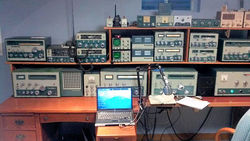
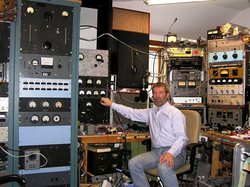
.jpg) In the past couple of years, many manufacturers of Amateur Radio transceivers have made their equipment sound good and talk well on AM, without having to make complicated adjustments. That's great!
In the past couple of years, many manufacturers of Amateur Radio transceivers have made their equipment sound good and talk well on AM, without having to make complicated adjustments. That's great!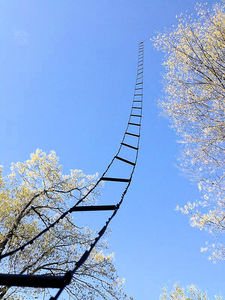
 Radio amateurs will transmit on Amateur Radio frequencies and listen on military frequencies, while military stations will transmit on military frequencies and listen on Amateur Radio frequencies. The annual event tests two-way communication between radio amateurs and military stations (authorized under §97.111 of the Amateur Service rules). It features traditional military-to-amateur crossband SSB voice, CW, practice using legacy interoperability waveforms, and the opportunity for participating hams to utilize more modern military modes, such as MIL-STD Serial PSK and Automatic Link Establishment (ALE). Military stations and Amateur Radio stations are authorized to communicate directly on certain 60-meter interoperability channels -- 5,330.5, 5346.5, and 5,371.5 kHz.
Radio amateurs will transmit on Amateur Radio frequencies and listen on military frequencies, while military stations will transmit on military frequencies and listen on Amateur Radio frequencies. The annual event tests two-way communication between radio amateurs and military stations (authorized under §97.111 of the Amateur Service rules). It features traditional military-to-amateur crossband SSB voice, CW, practice using legacy interoperability waveforms, and the opportunity for participating hams to utilize more modern military modes, such as MIL-STD Serial PSK and Automatic Link Establishment (ALE). Military stations and Amateur Radio stations are authorized to communicate directly on certain 60-meter interoperability channels -- 5,330.5, 5346.5, and 5,371.5 kHz..jpg) Sponsored by
Sponsored by .JPG) "Amateur Radio operation is an existing use at Baker Island NWR; however, it is not a common use," the FWS said in opening the Draft Compatibility Determination for comment. "The Service last permitted an Amateur Radio operator group to access Baker Island NWR in April 2002. The SUP authorizing this use will include stipulations, conditions, and restrictions to ensure compatibility and mitigate for potential anticipated impacts to refuge resources."
"Amateur Radio operation is an existing use at Baker Island NWR; however, it is not a common use," the FWS said in opening the Draft Compatibility Determination for comment. "The Service last permitted an Amateur Radio operator group to access Baker Island NWR in April 2002. The SUP authorizing this use will include stipulations, conditions, and restrictions to ensure compatibility and mitigate for potential anticipated impacts to refuge resources."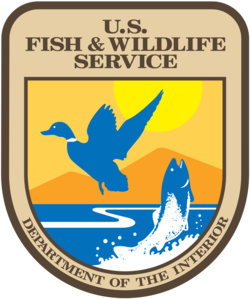 Visitors to Baker Island would be accompanied by an FWS representative, who would approve the landing zone. The FWS would also have to approve QSL cards to ensure that they include "an informative or educational statement about the Refuge." The FWS called QSLs "a valuable outreach tool."
Visitors to Baker Island would be accompanied by an FWS representative, who would approve the landing zone. The FWS would also have to approve QSL cards to ensure that they include "an informative or educational statement about the Refuge." The FWS called QSLs "a valuable outreach tool."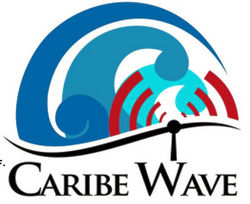 "Tsunami occurrences are relatively infrequent in Puerto Rico and the Virgin Islands. The most significant historical events happened in 1867 and 1918," a NOAA/NWS report said. "However, the Puerto Rico Trench and other seismic zones in the Caribbean region are all capable of generating tsunamis." NOAA said vulnerability in the region is very high, due to greater population density and tourist activity along the coast.
"Tsunami occurrences are relatively infrequent in Puerto Rico and the Virgin Islands. The most significant historical events happened in 1867 and 1918," a NOAA/NWS report said. "However, the Puerto Rico Trench and other seismic zones in the Caribbean region are all capable of generating tsunamis." NOAA said vulnerability in the region is very high, due to greater population density and tourist activity along the coast.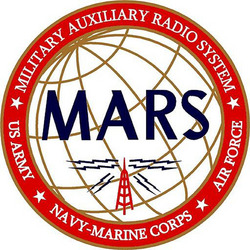 Addressing the first day of the gathering, English highlighted MARS participation in two NORTHCOM-sponsored exercises that are taking place this week -- one in Lake Delton, Wisconsin, supporting the Wisconsin Army National Guard and Office of Emergency Management, and the other in New York and New Jersey called "Gotham Shield."
Addressing the first day of the gathering, English highlighted MARS participation in two NORTHCOM-sponsored exercises that are taking place this week -- one in Lake Delton, Wisconsin, supporting the Wisconsin Army National Guard and Office of Emergency Management, and the other in New York and New Jersey called "Gotham Shield.".jpg)
.jpg) hosting WRTC, which takes place in conjunction with the
hosting WRTC, which takes place in conjunction with the 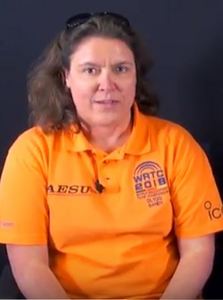

 "This is an inspirational record Peggy is setting today, and she would be the first to tell you this is a record that's absolutely made to be broken as we advance our knowledge and existence as both Americans and humans," said NASA acting Administrator Robert Lightfoot.
"This is an inspirational record Peggy is setting today, and she would be the first to tell you this is a record that's absolutely made to be broken as we advance our knowledge and existence as both Americans and humans," said NASA acting Administrator Robert Lightfoot.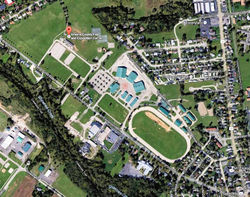
.jpg) Spratly Islands DXpedition Postponed: An international Amateur Radio team has postponed its DXpedition to the Spratly Islands, planned for December 2017. The DXpedition, which will take place from Layang Layang Island (Swallow Reef -- AS-051) under Malaysian call sign 9M0W, now will be on the air March 10-20, 2018. Operation will be on 160 through 6 meters, CW, SSB, and digital modes. Layang Layang Island is approximately 15 acres, which includes "reclaimed" land. While the Royal Malaysian Navy maintains a presence on the reef, ownership -- as with all of the Spratlys -- is disputed. It is also claimed by the People's Republic of China, Taiwan, and Vietnam.
Spratly Islands DXpedition Postponed: An international Amateur Radio team has postponed its DXpedition to the Spratly Islands, planned for December 2017. The DXpedition, which will take place from Layang Layang Island (Swallow Reef -- AS-051) under Malaysian call sign 9M0W, now will be on the air March 10-20, 2018. Operation will be on 160 through 6 meters, CW, SSB, and digital modes. Layang Layang Island is approximately 15 acres, which includes "reclaimed" land. While the Royal Malaysian Navy maintains a presence on the reef, ownership -- as with all of the Spratlys -- is disputed. It is also claimed by the People's Republic of China, Taiwan, and Vietnam. Motorola Solutions Expands Patent Infringement Complaints against Hytera:
Motorola Solutions Expands Patent Infringement Complaints against Hytera: 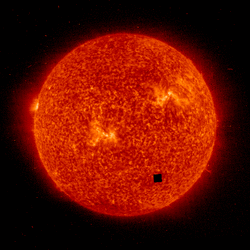 The day with the most geomagnetic activity was April 22, when the planetary A index was 54. On the same date, Alaska's College A index (near Fairbanks) was 86.
The day with the most geomagnetic activity was April 22, when the planetary A index was 54. On the same date, Alaska's College A index (near Fairbanks) was 86.







